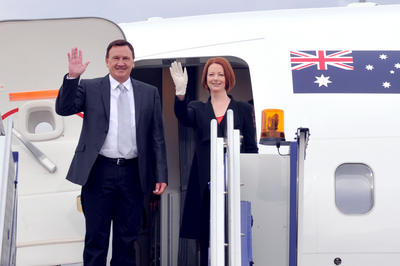Instead, the visit is about demonstrating that Australia is a friend of Japan beyond considerations of trade, investment and narrow political interests.
The decision by Ms Gillard to visit the town of Minami-Sanriku, where an Australian search and rescue contingent assisted the Japanese in the days following the tsunami is to be applauded, highlighting as it does the deep personal connections that Australia has with Japan.
The major issue on the agenda before the earthquake set other priorities was the still unconcluded Free Trade Agreement negotiations. The latest round of negotiations, which began in 2007, was held in February and marked a return to the table after nearly a ten months hiatus. Then, officials from Japan and Australia were unable to make a breakthrough, prompting Trade Minister Kaieda Banri to call for the negotiations to be resolved at the political level, around a summit at the head of state level. This is an appropriate response, as the Agreement was initially proposed by Prime Minister Abe Shinzo as part of a political calculus of the benefits of such an agreement to both countries.
Managing the reconstruction effort in Japan has become the all-consuming task for the DPJ leadership, and there is little space or time to pursue selling the merits of trade liberalization when hundreds of thousands, including many farmers, remain in shelters and surviving on government emergency assistance. Trade liberalization has therefore moved from an election issue of some significance to a political footnote. Kan will be judged at the next election on his administration’s management during and after the disaster.
While there is no obvious challenger to leadership of the Party, recent public polling in December showed low support for the Kan administration (at 21 per cent). On the other hand the crisis has helped to take the focus away from a series of financial scandals which threatened to destroy Kan and perhaps the DPJ government not so long ago. Some (less rigorous) polling by Fuji Television shows Kan’s approval jumped up to 35 per cent in the aftermath of the crisis. However, most (60 per cent) of Japanese do not appraise the handling of the crisis by the Kan administration positively and the outlook for the DPJ is grim.
It is unlikely that Kan and the DPJ leadership have the political will or space to meet head-on Australia’s expectations for a political conclusion of the negotiations on liberalization within the FTA, finally breaking through Japanese agricultural protectionism.
The summit between Mr Kan and Ms Gillard is about being there in Japan’s time of need, a reminder of the deep and personal links between the two communities, and putting them on modest display. If Ms Gillard plays it right it will also be a reminder that foreign friends are friends in deed, and that human and food security are bolstered by reliable international partnerships, not weakened by them, in the face of great natural disasters like that which Japan has just suffered.
Joel Rathus is a recent PhD graduate from Adelaide University, an EAF scholar and a regular contributor to the East Asia Forum. His other posts can be found here.


The Japanese head of state is the Emperor, the Australian head of state is the Queen. It is hard to imagine these two finalising FTA negotiations.
The Japanese Emperor is not the head of state. He is merely the ‘symbol’ of the state (see Article 1 of the Constitution). He has no powers of governance (see Article 4). Japan has no ‘head of state’, although the Japanese Constitution, unlike the Australian Constitution, does refer to the Prime Minister and to the Cabinet.
I stand corrected by Aurelia,but Articles 6 and 7 of the Constitution list several of the activities normally performed by a head of state, such as the appointment of the head of government.
The differences between the Queen’s formal powers of governance even in Australia and the Japanese Emperor’s lack of them could not be more stark. The queen is formally defined as the head of the government in the Australian Constitution. The Constitution states that the executive power of the Commonwealth is vested in the Queen, regardless of actual practice, so one can argue that she is, therefore, the Australian head of state. However, the Japanese Emperor was explicitly written out of government by the Occupation authorities under the 1947 Constitution. Articles 6 and 7 of the Constitution make it clear that such ‘political’ functions that the Emperor performs are nominal and ceremonial, and only in response to prior designation by the Diet or Cabinet, or on the advice and approval of the Cabinet. It is the absence of such explicit direction in the Australian Constitution that justifies the Queen’s claim to be still considered as head of state. In contrast, Article 65 of the Japanese Constitution states quite clearly that ‘Executive power shall be vested in the Cabinet’, which, under Article 66, consists of the prime minister and ministers of state who, in the exercise of executive power, are collectively responsible to the Diet (not to the Emperor who, under the Meiji Constitution, could appoint and dismiss ministers of state).
Japanese Trade Minister Kaieda needs to be informed that his call for FTA negotiations to be finalised around a summit at the head of state level is impossible since his country does not have a head of state.
He would have meant the prime minister and assumed the same for Australia, not realising our constitutional differences.
Could you please add the following to my last comment:
Checking the original article in the Nikkei of 12th February reveals that Kaieda himself did not use the term ‘head of state’; he referred only to ‘a summit and ministerial talks’.